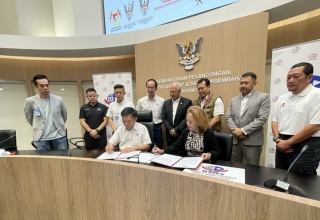
A Big Move for a Greener Future
Malaysia is going for a greener future with a new law to become a top player in carbon capture, usage, and storage (CCUS). On Thursday, March 6, the government passed a law that sets up the rules for CCUS, a way to cut pollution and fight climate change.
CCUS: Not Just Green but Good for the Economy
The Malaysian government thinks CCUS is good for the environment and offers a huge chance to make money. They think this new field could make up to US$250 billion and create lots of jobs by 2050.
How CCUS Works
CCUS catches carbon pollution from burning fuels and factory work. It then stores it away for good underground. Big polluters like heavy manufacturing, oil, and gas see CCUS as a way to reduce their pollution. The UN’s climate group backs this tech, mainly for industries that have a hard time cutting pollution.
Malaysia Eyes a Giant Role In Carbon Capture
Malaysia means business about going green. The law to become a giant player in carbon capture, use, and storage (CCUS) has been ratified. On March 6, the government approved the regulations laying out how CCUS will be developed, touching on stopping pollution and climate change.
https://x.com/MalaysiaGazette/status/1897527437216584112
All That Glitter Is Not CCUS- Money Could Readily Be Show
And the government thinks CCUS is not just good for Mother Earth but also a good avenue for making mega dough. Stakeholders reckon this budding industry could net Malaysia an astounding $250 billion and millions of jobs by 2050.
How Does CCUS Work?
In brief, carbon dioxide emissions are captured when fossil fuels are combusted or when industrial activities are in place, then stored deeply underground. Big polluters like heavy industries, oil, and gas consider CCUS as an opportunity for reformation. Even the UN waxes lyrical about it, especially for industries that face great hardship in reducing pollution.
The Other Perspective All Bright Lights Begin
Less confidence has been put forward by some people over CCUS. Some environmental groups have raised the red flag that CCUS will be a way for companies to continue burning fossil fuel rather than diverting to cleaner energy. Others, calling it expensive and complicated, are doubtful that it is going to work.
Malaysia’s Ambition: Being No. 1
Doubts aside, Rafizi Ramli, Malaysia’s economy minister, believes that his country can be a leader in CCUS. It allows Malaysia to meet its climate objectives and ensures that they are at the forefront of low-carbon technology.
According to Ramli, Malaysia will be a global leader in CCUS because right now, only Norway has done a good job with it.
A Wonderful Place for Carbon Storage
Malaysia has an advantage: abundant old oil fields ideal for underground carbon dioxide storage. The new law regulating carbon dioxide injection and permanent offshore storage will come into force on March 31. But it will only apply to Peninsular Malaysia and Labuan; east Malaysia’s Sabah and Sarawak are not in the picture because they want to regulate their economy.
The Road Ahead
In truth, CCUS is a serious gamble for Malaysia. Environmental changes and financial sustainability are the two factors that give hope to its success.






















